- Home
- Laini Taylor
Strange the Dreamer
Strange the Dreamer Read online
Copyright
This book is a work of fiction. Names, characters, places, and incidents are the product of the author’s imagination or are used fictitiously. Any resemblance to actual events, locales, or persons, living or dead, is coincidental.
Copyright © 2017 by Laini Taylor
Cover design by Maggie Edkins. Metal texture © Waj/Shutterstock.com
Gold foil © ninanaina/Shutterstock.com. Distressed paper texture © LeksusTuss/Shutterstock.com
Cover copyright © 2017 by Hachette Book Group, Inc.
Hachette Book Group supports the right to free expression and the value of copyright. The purpose of copyright is to encourage writers and artists to produce the creative works that enrich our culture.
The scanning, uploading, and distribution of this book without permission is a theft of the author’s intellectual property. If you would like permission to use material from the book (other than for review purposes), please contact [email protected]. Thank you for your support of the author’s rights.
Little, Brown and Company
Hachette Book Group
1290 Avenue of the Americas, New York, NY 10104
Visit us at lb-teens.com
First Edition: March 2017
Little, Brown and Company is a division of Hachette Book Group, Inc. The Little, Brown name and logo are trademarks of Hachette Book Group, Inc.
The publisher is not responsible for websites (or their content) that are not owned by the publisher.
ISBNs: 978-0-316-34168-4 (hardcover), 978-0-316-43120-0 (int’l), 978-0-316-46427-7 (large print), 978-0-316-34164-6 (ebook)
E3-20170126-JV-NF
CONTENTS
COVER
TITLE PAGE
COPYRIGHT
DEDICATION
PROLOGUE
PART I CHAPTER 1: MYSTERIES OF WEEP
CHAPTER 2: THE DREAM CHOOSES THE DREAMER
CHAPTER 3: THE COMPLETE WORKS OF LAZLO STRANGE
CHAPTER 4: THE BASTARD GOD OF FORTUNE
CHAPTER 5: MIRACLES FOR BREAKFAST
CHAPTER 6: PAPER, INK, AND YEARS
CHAPTER 7: IMPOSSIBLE DREAM
CHAPTER 8: TIZERKANE
CHAPTER 9: A RARE OPPORTUNITY
CHAPTER 10: NO STORY YET TOLD
CHAPTER 11: TWELFTHMOON
PART II CHAPTER 12: KISSING GHOSTS
CHAPTER 13: PURGATORY SOUP
CHAPTER 14: BEAUTIFUL AND FULL OF MONSTERS
CHAPTER 15: THE OLDEST STORY IN THE WORLD
CHAPTER 16: A HUNDRED SMITHEREENS OF DARKNESS
CHAPTER 17: THE MUSE OF NIGHTMARES
CHAPTER 18: THE FUSED BONES OF SLAUGHTERED DEMONS
CHAPTER 19: THE SHADOW OF OUR DARK TIME
CHAPTER 20: DEAD MAN’S NEWS
CHAPTER 21: THE PROBLEM IN WEEP
CHAPTER 22: PATTERN OF LIGHT, SCRIBBLE OF DARKNESS
PART III CHAPTER 23: UNSEEN NO LONGER
CHAPTER 24: OBSCENITY. CALAMITY. GODSPAWN.
CHAPTER 25: THE NIGHT AND THE NEWCOMERS
CHAPTER 26: BROKEN PEOPLE
CHAPTER 27: ANOTHER WORLD
CHAPTER 28: NO WAY TO LIVE
CHAPTER 29: THE OTHER BABIES
CHAPTER 30: STOLEN NAME, STOLEN SKY
CHAPTER 31: DARLINGS AND VIPERS
CHAPTER 32: THE SPACE BETWEEN NIGHTMARES
CHAPTER 33: WE ARE ALL CHILDREN IN THE DARK
CHAPTER 34: SPIRIT OF LIBRARIAN
CHAPTER 35: BLURRED INK
CHAPTER 36: SHOPPING FOR A MOON
CHAPTER 37: A PERFECTLY DELIGHTFUL SHADE OF BLUE
CHAPTER 38: EVERYONE WILL DIE
CHAPTER 39: UNCANNY ENEMIES
PART IV CHAPTER 40: MERCY
CHAPTER 41: WITCHLIGHT
CHAPTER 42: GOD OR MONSTER, MONSTER OR GOD
CHAPTER 43: A SINGULARLY UNHORRIBLE DEMON
CHAPTER 44: AN EXTRAORDINARY SUGGESTION
CHAPTER 45: STRANGE AZOTH
CHAPTER 46: JUST A DREAM
CHAPTER 47: THE TERRORS
CHAPTER 48: NO PLACE IN THE WORLD
CHAPTER 49: VEIL OF REVERIE
CHAPTER 50: THE WHOLE DAY TO GET THROUGH
CHAPTER 51: POLTROONS
CHAPTER 52: AMAZING, BUT SCORCHED
CHAPTER 53: TARNISHED HEARTS
CHAPTER 54: TOO LOVELY NOT TO DEVOUR
CHAPTER 55: DISFAITH
CHAPTER 56: THE DREAMSMITHS
CHAPTER 57: THE SECRET LANGUAGE
CHAPTER 58: ONE-PLUM WRATH
CHAPTER 59: GRAY AS RAIN
CHAPTER 60: SOMETHING ODD
CHAPTER 61: HOT AND ROTTEN AND WRONG
CHAPTER 62: A CALM APOCALYPSE
CHAPTER 63: WEIGHTLESS
CHAPTER 64: WHAT VERSION OF THE WORLD
CHAPTER 65: WINDFALL
CHAPTER 66: GOD AND GHOST
CHAPTER 67: PEACE WITH THE IMPOSSIBLE
ACKNOWLEDGMENTS
For Alexandra, unique in the world
PROLOGUE
On the second Sabbat of Twelfthmoon, in the city of Weep, a girl fell from the sky.
Her skin was blue, her blood was red.
She broke over an iron gate, crimping it on impact, and there she hung, impossibly arched, graceful as a temple dancer swooning on a lover’s arm. One slick finial anchored her in place. Its point, protruding from her sternum, glittered like a brooch. She fluttered briefly as her ghost shook loose, and torch ginger buds rained out of her long hair.
Later, they would say these had been hummingbird hearts and not blossoms at all.
They would say she hadn’t shed blood but wept it. That she was lewd, tonguing her teeth at them, upside down and dying, that she vomited a serpent that turned to smoke when it hit the ground. They would say a flock of moths came, frantic, and tried to lift her away.
That was true. Only that.
They hadn’t a prayer, though. The moths were no bigger than the startled mouths of children, and even dozens together could only pluck at the strands of her darkening hair until their wings sagged, sodden with her blood. They were purled away with the blossoms as a grit-choked gust came blasting down the street. The earth heaved underfoot. The sky spun on its axis. A queer brilliance lanced through billowing smoke, and the people of Weep had to squint against it. Blowing grit and hot light and the stink of saltpeter. There had been an explosion. They might have died, all and easily, but only this girl had, shaken from some pocket of the sky.
Her feet were bare, her mouth stained damson. Her pockets were all full of plums. She was young and lovely and surprised and dead.
She was also blue.
Blue as opals, pale blue. Blue as cornflowers, or dragonfly wings, or a spring—not summer—sky.
Someone screamed. The scream drew others. The others screamed, too, not because a girl was dead, but because the girl was blue, and this meant something in the city of Weep. Even after the sky stopped reeling, and the earth settled, and the last fume spluttered from the blast site and dispersed, the screams went on, feeding themselves from voice to voice, a virus of the air.
The blue girl’s ghost gathered itself and perched, bereft, upon the spearpoint-tip of the projecting finial, just an inch above her own still chest. Gasping in shock, she tilted back her invisible head and gazed, mournfully, up.
The screams went on and on.
And across the city, atop a monolithic wedge of seamless, mirror-smooth metal, a statue stirred, as though awakened by the tumult, and slowly lifted its great horned head.
PART I
shrestha (SHRES·thuh) noun
When a dream comes true—but not for the dreamer.
Archaic; from Shres, the bastard god
of fortune, who was believed to punish<
br />
supplicants for inadequate offerings by
granting their hearts’ desire to another.
1
MYSTERIES OF WEEP
Names may be lost or forgotten. No one knew that better than Lazlo Strange. He’d had another name first, but it had died like a song with no one left to sing it. Maybe it had been an old family name, burnished by generations of use. Maybe it had been given to him by someone who loved him. He liked to think so, but he had no idea. All he had were Lazlo and Strange—Strange because that was the surname given to all foundlings in the Kingdom of Zosma, and Lazlo after a monk’s tongueless uncle.
“He had it cut out on a prison galley,” Brother Argos told him when he was old enough to understand. “He was an eerie silent man, and you were an eerie silent babe, so it came to me: Lazlo. I had to name so many babies that year I went with whatever popped into my head.” He added, as an afterthought, “Didn’t think you’d live anyway.”
That was the year Zosma sank to its knees and bled great gouts of men into a war about nothing. The war, of course, did not content itself with soldiers. Fields were burned; villages, pillaged. Bands of displaced peasants roamed the razed countryside, fighting the crows for gleanings. So many died that the tumbrils used to cart thieves to the gallows were repurposed to carry orphans to the monasteries and convents. They arrived like shipments of lambs, to hear the monks tell it, and with no more knowledge of their provenance than lambs, either. Some were old enough to know their names at least, but Lazlo was just a baby, and an ill one, no less.
“Gray as rain, you were,” Brother Argos said. “Thought sure you’d die, but you ate and you slept and your color came normal in time. Never cried, never once, and that was unnatural, but we liked you for it fine. None of us became monks to be nursemaids.”
To which the child Lazlo replied, with fire in his soul, “And none of us became children to be orphans.”
But an orphan he was, and a Strange, and though he was prone to fantasy, he never had any delusions about that. Even as a little boy, he understood that there would be no revelations. No one was coming for him, and he would never know his own true name.
Which is perhaps why the mystery of Weep captured him so completely.
There were two mysteries, actually: one old, one new. The old one opened his mind, but it was the new one that climbed inside, turned several circles, and settled in with a grunt—like a satisfied dragon in a cozy new lair. And there it would remain—the mystery, in his mind—exhaling enigma for years to come.
It had to do with a name, and the discovery that, in addition to being lost or forgotten, they could also be stolen.
He was five years old when it happened, a charity boy at Zemonan Abbey, and he’d snuck away to the old orchard that was the haunt of nightwings and lacewings to play by himself. It was early winter. The trees were black and bare. His feet breached a crust of frost with every step, and the cloud of his breath accompanied him like a chummy ghost.
The Angelus rang, its bronze voice pouring through the sheepfold and over the orchard walls in slow, rich waves. It was a call to prayer. If he didn’t go in, he would be missed, and if he was missed, he would be whipped.
He didn’t go in.
Lazlo was always finding ways to slip off on his own, and his legs were always striped from the hazel switch that hung from a hook with his name on it. It was worth it. To get away from the monks and the rules and the chores and the life that pinched like tight shoes.
To play.
“Turn back now if you know what’s good for you,” he warned imaginary enemies. He held a “sword” in each hand: black apple branches with the stout ends bound in twine to make hilts. He was a small, underfed waif with cuts on his head where the monks nicked it, shaving it against lice, but he held himself with exquisite dignity, and there could be no doubt that in his own mind, in that moment, he was a warrior. And not just any warrior, but a Tizerkane, fiercest that ever was. “No outsider,” he told his foes, “has ever set eyes on the forbidden city. And as long as I draw breath, none ever will.”
“We’re in luck, then,” the foes replied, and they were more real to him in the twilight than the monks whose chanting drifted downhill from the abbey. “Because you won’t be drawing breath for much longer.”
Lazlo’s gray eyes narrowed to slits. “You think you can defeat me?”
The black trees danced. His breath-ghost scudded away on a gust, only to be replaced by another. His shadow splayed out huge before him, and his mind gleamed with ancient wars and winged beings, a mountain of melted demon bones and the city on the far side of it—a city that had vanished in the mists of time.
This was the old mystery.
It had come to him from a senile monk, Brother Cyrus. He was an invalid, and it fell to the charity boys to bring him his meals. He wasn’t kind. No grandfather figure, no mentor. He had a terrible grip, and was known to hold the boys by the wrist for hours, forcing them to repeat nonsense catechisms and confess to all manner of wickedness they could scarce understand, let alone have committed. They all had a terror of him and his gnarled raptor hands, and the bigger boys, sooner than protect the smaller, sent them to his lair in their stead. Lazlo was as scared as the rest, yet he volunteered to bring all the meals.
Why?
Because Brother Cyrus told stories.
Stories were not smiled upon at the abbey. At best, they distracted from spiritual contemplation. At worst, they honored false gods and festered into sin. But Brother Cyrus had gone beyond such strictures. His mind had slipped its moorings. He never seemed to understand where he was, and his confusion infuriated him. His face grew clenched and red. Spittle flew when he ranted. But he had his moments of calm: when he slipped through some cellar door in his memory, back to his boyhood and the stories his grandmother used to tell him. He couldn’t remember the other monks’ names, or even the prayers that had been his vocation for decades, but the stories poured from him, and Lazlo listened. He listened the way a cactus drinks rain.
In the south and east of the continent of Namaa—far, far from northerly Zosma—there was a vast desert called the Elmuthaleth, the crossing of which was an art perfected by few and fiercely guarded against all others. Somewhere across its emptiness lay a city that had never been seen. It was a rumor, a fable, but it was a rumor and fable from which marvels emerged, carried by camels across the desert to fire the imaginations of folk the world over.
The city had a name.
The men who drove the camels, who brought the marvels, they told the name and they told stories, and the name and the stories made their way, with the marvels, to distant lands, where they conjured visions of glittering domes and tame white stags, women so beautiful they melted the mind, and men whose scimitars blinded with their shine.
For centuries this was so. Wings of palaces were devoted to the marvels, and shelves of libraries to the stories. Traders grew rich. Adventurers grew bold, and went to find the city for themselves. None returned. It was forbidden to faranji—outsiders—who, if they survived the Elmuthaleth crossing, were executed as spies. Not that that stopped them from trying. Forbid a man something and he craves it like his soul’s salvation, all the more so when that something is the source of incomparable riches.
Many tried.
None ever returned.
The desert horizon birthed sun after sun, and it seemed as if nothing would ever change. But then, two hundred years ago, the caravans stopped coming. In the western outposts of the Elmuthaleth—Alkonost and others—they watched for the heat-distorted silhouettes of camel trains to emerge from the emptiness as they always had, but they did not.
And they did not.
And they did not.
There were no more camels, no more men, no more marvels, and no more stories. Ever. That was the last that was ever heard from the forbidden city, the unseen city, the lost city, and this was the mystery that had opened Lazlo’s mind like a door.
What had happened?
Did the city still exist? He wanted to know everything. He learned to coax Brother Cyrus into that place of reverie, and he collected the stories like treasure. Lazlo owned nothing, not one single thing, but from the first, the stories felt like his own hoard of gold.
The domes of the city, Brother Cyrus said, were all connected by silk ribbons, and children balanced upon them like tightrope walkers, dashing from palace to palace in capes of colored feathers. No doors were ever closed to them, and even the birdcages were open for the birds to come and go as they pleased, and wondrous fruits grew everywhere, ripe for the plucking, and cakes were left out on window ledges, free for the taking.
Lazlo had never even seen cake, let alone tasted it, and he’d been whipped for eating windfall apples that were more worm than fruit. These visions of freedom and plenty bewitched him. Certainly, they distracted from spiritual contemplation, but in the same way that the sight of a shooting star distracts from the ache of an empty belly. They marked his first consideration that there might be other ways of living than the one he knew. Better, sweeter ways.
The streets of the city, Brother Cyrus said, were tiled with lapis lazuli and kept scrupulously clean so as not to soil the long, long hair the ladies wore loose and trailing behind them like bolts of blackest silk. Elegant white stags roamed the streets like citizens, and reptiles big as men drifted in the river. The first were spectrals, and the substance of their antlers—spectralys, or lys—was more precious than gold. The second were svytagors, whose pink blood was an elixir of immortality. There were ravids, too—great cats with fangs like scythes—and birds that mimicked human voices, and scorpions whose sting imparted superhuman strength.
And there were the Tizerkane warriors.
They wielded blades called hreshtek, sharp enough to slice a man off his shadow, and kept scorpions in brass cages hooked to their belts. Before battle, they would thrust a finger through a small opening to be stung, and under the influence of the venom, they were unstoppable.
“You think you can defeat me?” Lazlo defied his orchard foes.

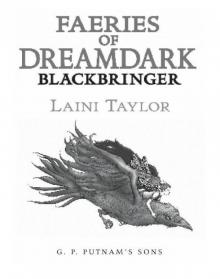 Blackbringer
Blackbringer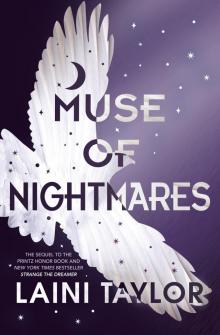 Muse of Nightmares
Muse of Nightmares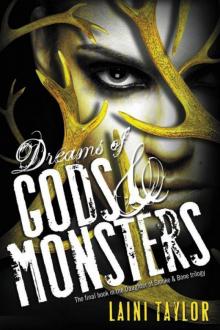 Dreams of Gods & Monsters
Dreams of Gods & Monsters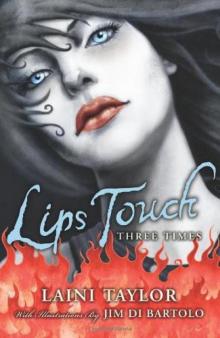 Lips Touch: Three Times
Lips Touch: Three Times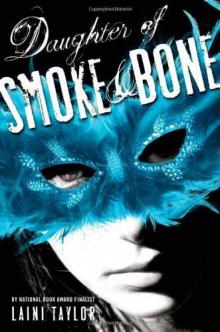 Daughter of Smoke & Bone
Daughter of Smoke & Bone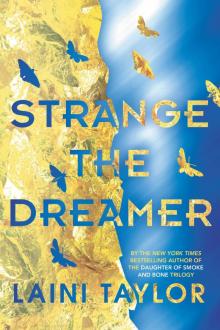 Strange the Dreamer
Strange the Dreamer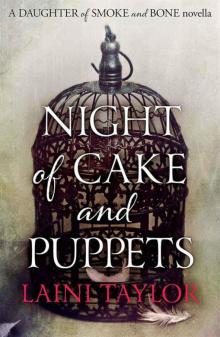 Night of Cake & Puppets
Night of Cake & Puppets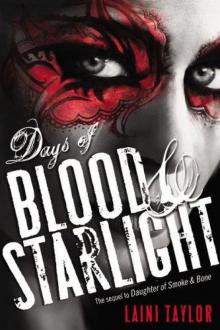 Days of Blood & Starlight
Days of Blood & Starlight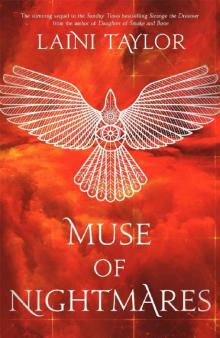 Muse of Nightmares (Strange the Dreamer #2_UK)
Muse of Nightmares (Strange the Dreamer #2_UK)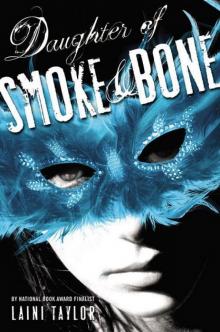 Daughter of Smoke and Bone dosab-1
Daughter of Smoke and Bone dosab-1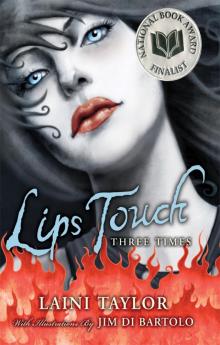 Three Times
Three Times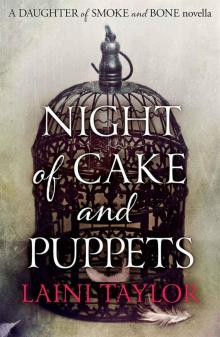 Night of Cake and Puppets (a Daughter of Smoke and Bone novella)
Night of Cake and Puppets (a Daughter of Smoke and Bone novella)